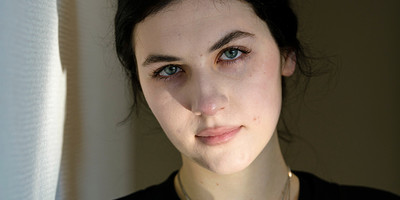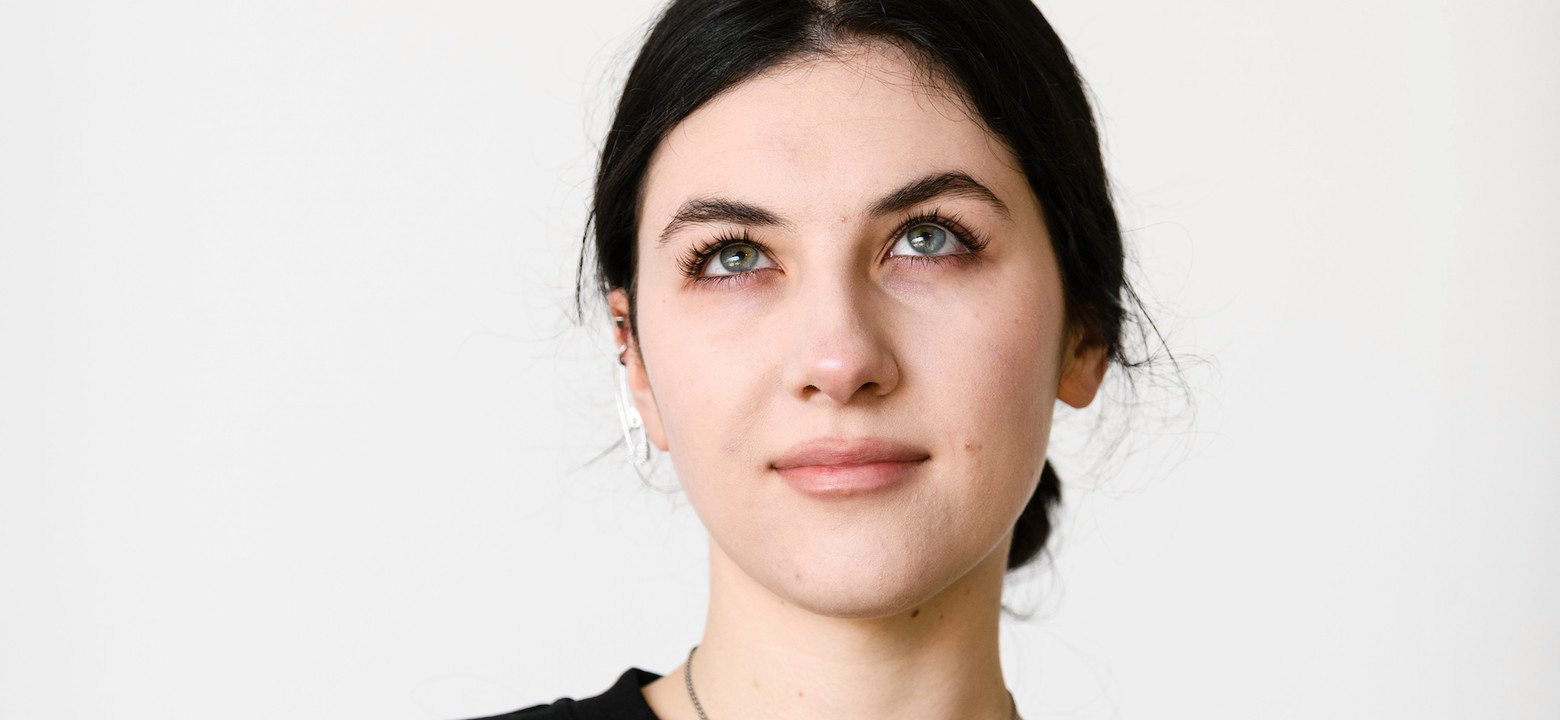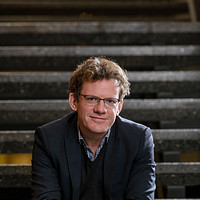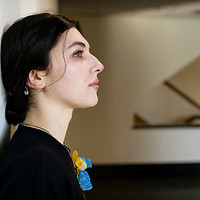On the one hand, she feels guilty that she is safe here in the Netherlands, while family and friends of Ruslana (19) are sheltering from the bombs in Ukraine. On the other hand, she is proud of her people, who refuse to capitulate to Putin and take up the fight. In Enschede, the Fashion & Textile Technologies student is trying to make the best of it. The explicit wish of her parents: go to school. It is difficult. "The aid for Ukraine activities at Saxion give me a purpose."
Ruslana Bosakevych doesn't hesitate when SaxNow asks her for an interview. She would like to be a spokesperson for the Ukrainian community to tell the story. Because all the world needs to see how a sovereign country, with a proud European people, is a victim of a macabre geopolitical game. And how the war is risking the future of herself, her generation and her country. "This is what I can do," she says. "Create awareness. The whole world needs to see how Ukraine is fighting. For its own security, but also for Europe."
She wears the Ukrainian colors close to her heart, because she is proud of her country. And of her parents, who are in a suburb of Kyiv. "A relative, who works for the police, called when Putin announced that he was recognizing the eastern Ukrainian areas in the Donbas, Luhansk and Donetsk, as independent states. 'Leave Ukraine, because war is coming,' he said. But my parents stayed to defend the country."
Dreams exploded
Two days after Putin's speech, on February 24, Russian tanks rolled across the border. Ruslana woke up to a new reality, the sophomore says. "My time here in Enschede is the happiest of my life. I enjoyed studying, going out, making friends. And I had dreams. To do a minor in Canada or Denmark, to get a few years of work experience and then go back to Ukraine, maybe to start my own business."
"How will I pay tuition in June/July? I really have no idea..."
That future is uncertain, may be in tatters. For her studies at Saxion, she depends on her parents. They have a building/construction company, but that is out of business now. "In fact, my father has donated the materials he advanced to the defense of Kyiv. No money is coming in." This makes her situation extremely precarious. "I live with an acquaintance in a flat, but the rent is suddenly much too high." Income she doesn't have right now. Looking a little further ahead than a few days or weeks, she worries. "How will I pay tuition in June/July? I really have no idea..."
Proud country
Ruslana struggles to talk about her own problems and worries; the story should be about the injustice done to her country and the people there, she thinks. Because Ukraine is a proud country. We hear the stories more often, that maybe Ukraine should not have believed the 1994 promise. That's when they gave up Soviet nuclear weapons, with the agreement that Russia would guarantee the country's independence. Or the Maidan revolution in 2014, when the people demanded a close relationship to Europe and ordered Russian-backed President Yanukovyts resignation. She was there as a 10/11-year-old, Ruslana recounts. "We too went into the square to protest and make our voices heard: because we belong to Europe."
In Enschede she has numerous international friends, with whom she talks about the situation. They are also from Syria and Palestine, and for those conflict areas there is much less attention. "I understand why they say that, and I also agree with it," Ruslana says. "But this is my struggle, about this I have to speak out."
All victims
She also speaks to Russian and Belarusian students, some of whom are friends of hers. But Ruslana is troubled by the fact that the Dutch government and her educational institution all treat these students as victims of Putin's regime. "There are students who speak out fully against Putin and this war, and we have Russian students who participate in our aid actions at Saxion for Ukraine," Ruslana says. "At the same time, I think: their cities back home are not under attack, they can just keep visiting their families, via Asia if necessary. And for us... we don't know what tomorrow's day looks like."

Photography: Cees Elzenga
This is an unreal feeling for the student, one she tries to give place to. This fails when she opens an app group in which a Russian student posts: ‘Don't be so pessimistic,’ or when the suffering of Ukrainians is questioned. "So what do you want, for us to be optimistic about this war? And at the end of the day, it's not Putin throwing bombs by himself, it's Russian soldiers, in Russian tanks."
From day to day
In this alienated world, Ruslana, like the other 75 Ukrainian students, tries to get through the days and do the best she can. Today an exam is on the agenda. But how long will the money last? Should she take a gap year and live in a country where life is a little cheaper, such as Poland where she has a relative? "Where we had dreams before, now we live day-to-day," she says.
But she is happy with the help from Saxion. She feels heard, given the space to speak out and set up the aid campaign. "I didn't expect that from an educational institution."
Teachers approach her: are you okay? "Also teachers from before, who I don't know that well. That's nice." Saxion gave a voucher for the Jumbo this week, so she can get food, at least in the short term. The aid efforts, both in Deventer and Enschede, are catching on. The blankets, canned food and other goods, they go to where it is needed most. The organizing students receive videos from Ukraine, where the goods are delivered.
And yet that guilt remains: I'm here and they're there. "I don't need pity, but I want my life and family back," she says. And her greatest wish right now? She repeats the words of President Zelenskyy: ‘Close the airspace over Ukraine’. "How many lives must be lost before the West intervenes? When will we learn from history and draw the line here? We need help from the international community now."

Emergency fund for affected students
Saxion has set up an emergency fund of 10,000 euros from which students from the Ukraine, Belarus and Russia can receive a financial contribution, says spokesperson Karin Effing. In addition, according to the spokesperson, there is support from the municipality of Enschede, Jongbloed Fiscal Lawyers and Damsté Lawyers, among others. The cabinet announced earlier that it would allocate one million euros for aid activities for all universities and universities of applied sciences. Saxion is in consultation with knowledge institutions such as the University of Twente and ARTEZ and the Twente Board about possibilities for support in the short and long term.
Last week Saxion organized several meetings in which the concerns of students from Ukraine, Belarus and Russia were shared. Effing: "Practical concerns came up. For example, that it is becoming more and more difficult for them to find money, which may cause them problems with their living expenses, housing, paying their tuition fees, but also concerns about possible study delays and stress. We further map out the questions and problems they have and see how we can help them. Both emotionally and financially."
For mental support, students can contact their SLB'er or one of the student deans or psychologists. For other questions, contact the International Office at [email protected].
Donate? You can.
In both Deventer and Enschede, aid has been set up by students. In Deventer this is on the third floor, at the reception of ACT. There is also a room (D3.26) with information about Ukraine. Two students will give a presentation about their country on Wednesday afternoon from 16.30. In Enschede, the students will be at Wolvecamp 2.29a from 10 am to 5 pm. Contact with Ruslana is possible: [email protected]
Want to donate money? You can do so via this link.
Gerelateerde artikelen
Fotoserie: Bijzonder schouwspel van menselijke en robotacrobaat tijdens lunchpauze in Enschede
Hij moest qua aandacht concurreren met nacho’s die werden uitgedeeld bij de kantine, maar toch gingen de bewonderende blikken vandaag tijdens de lunchpauze volop naar Daniel Simu. Al trok zijn bijzondere metgezel nog veel meer de aandacht: omdat hij niemand had om mee te trainen, bouwde de circusartiest zijn eigen trainingspartner: een robotacrobaat.
Geen gelijke vergoeding voor opleidingscommissies, tot onvrede studenten; “Niet uit te leggen”
Het college van bestuur is niet van plan de vergoeding voor studenten in de opleidingscommissies te verhogen naar 18,75 euro per uur, bleek gisteren in de centrale medezeggenschap. Studenten vroegen daar in de vergadering om, maar volgens collegevoorzitter Inge Grimm hoeft Saxion alleen de vergoeding voor de CMR en de academieraden aan te passen.
Nieuw schooljaar, nieuw cultureel seizoen: Studium Generale is niet bang voor de polemiek, maar wil ook wijzer maken
Van genocide tot schuld, trauma, een robotacrobaat, heftige hormonen en de macht van de technologie op je telefoon. Studium Generale wil ook dit studiejaar weer programma’s maken die het gesprek aanjagen, maar tegelijkertijd studenten verleiden met maatschappelijke onderwerpen die dichtbij hen staan. Ze zijn daarbij niet bang voor de polemiek, zeggen programmamakers Saskia Zwolle en Britt Krabbe. “En als we nog een blinde vlek hebben, dan horen we dat ook graag.”

